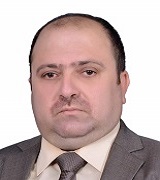| News Details |
The Revival of the Dead Land
2022-08-18

Assistant Professor Dr Nowfal Adnan Sabry
Upper Euphrates Basin Development Center / University of Anbar
God Almighty has appointed man on this earth and assigned him the task of reconstructing it. As he says: (He has produced you from the earth and settled you in it) (Hud: 61), and this responsibility placed on his shoulders requires striving, taking the reasons, and investing what God Almighty has subjugated to us. And the lands that were contracted and not used, so our article came to shed light on this issue, and put it before officials and decision-makers, as Islamic sharia allows those who revive a dead land to own it according to a specific concept and specific controls.
In the beginning, we get acquainted with the concept of (Dead Land): it is what has no soul, and what is meant here is the land that has no owner; The jurists define it as the land that is separated from jurisdictions and an infallible king, and this, it appears to us that the dead land: is the abandoned land that does not benefit from an aggressor, whether that is because of the lack of water from it, or the taking of water or stones, or sand on it or the nature of its soil or other reasons(1).
It came in the right hadith on the authority of Aisha, the mother of the believers, on the authority of the Prophet r (Whoever lives in a land that is not for anyone else, he is more entitled)(2) And in the honourable hadith, he urged the development of the land and the revival of the dead, for which no owner is known before him, and it was not related to the interest of the country or the village, and in this hadith is an indication of honouring the one who revives dead land, in addition to the eschatological honour that results as a result of what people and animals benefit from their cultivation, It was honoured to greet her to possess him.
Scholars have agreed that reviving the land is a reason for its ownership, but they differed on the issue of the requirement to obtain the permission of the governor or not. Permission is according to his madhhab, and Imam Shafi’i and Ibn Hanbal, may God have mercy on them both, went to say: The permission of the governor is not required in this case, and that is to encourage the reclamation of abandoned lands(3).
There is no doubt that our country, Iraq, and our governorate, in particular, are blessed with large areas of land that many people think are desert and unsuitable for cultivation. And all of this cannot be achieved unless it is based on a legitimate and legal basis that allows its institutions, such as the university, for example, or its specialized researchers, the possibility of working and exploiting those lands that complain of neglect and blind control by most of the contractors, for whom those contracts concluded with the Ministry of Agriculture were an excellent resource. They are outside the concept of the agricultural system, so effective solutions must be found that force them to reclaim those lands or leave them to those who can do so. It was reported on the authority of Abu Ubaidah in (Al-Amwal) on the authority of Al-Harith bin Bilal bin Al-Hath Al-Muzani, on the authority of his father, that the Messenger of GodrI cut the agate all together, and when Omar, may God be pleased with him, said to Bilal: “The Messenger of God did not cut you off to keep it from people, but I cut you off to work, so take from it what you were able to build and return the rest”(4).
[1] - Muhammad Abd Rabbo Muhammad Al-Sabhi: Reviving the dead land in Islamic law,The Second Scientific Conference of the College of Law - Tanta University, 2015, pg 4.
[2] - Sahih Al-Bukhari: The Book of Farming, Chapter: Whoever revives a dead land, Hadith No. 2335
[3] -Al-Tahawy, Ahmed bin Muhammad Salama: Explanation of the Meanings of Athar, Dar al-Kutub al-Ilmiyya, Beirut, 1993, vol. 3 / p. 268.
[4] - Ibn Asaker, Abi Ali Al-Qasim Ali Bin Al-Hassan: History of the City of Damascus, investigated by Mustafa Abdel Qader, Dar Al-Kutub Al-Ilmiyya, Beirut, d.T., p. 216.









